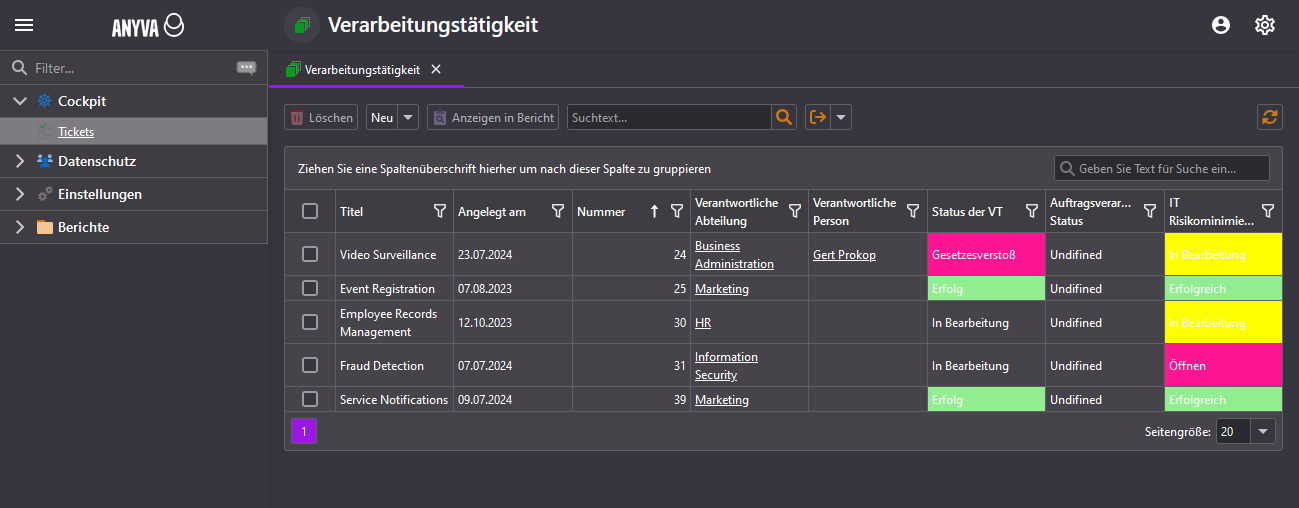
Why AnyvaStart?
In today's digital era, the protection of personal data is of central importance. With the introduction of the General Data Protection Regulation (GDPR) by the European Union in May 2018, strict guidelines were laid down to protect the privacy and personal data of citizens. A key component of this regulation is the obligation for organisations to keep a record of processing activities (RPA). This requirement applies to all organisations that offer goods and services in the EU and process personal data in the process.
According to Article 30 of the GDPR, you must keep a VVT:
The VVT is therefore a central element of accountability and transparency in data protection management and serves as proof to supervisory authorities that a company complies with the GDPR provisions.
What is AnyvaStart?
AnyvaStart offers a powerful solution to meet the legal requirements of the GDPR while increasing operational efficiency. The software includes a comprehensive List of processing activities and an integrated Ticket system, which considerably simplifies the management and tracking of data protection requests and incidents.
Simplicity and user-friendlinessAnyvaStart is designed to make the process of creating and maintaining a VVT as simple as possible. The user-friendly interface makes it possible for employees without technical expertise to efficiently enter and manage the required data. You are supported by a variety of templates and templates
Time and cost savingsBy automating many administrative tasks, AnyvaStart saves valuable time and reduces the costs associated with manual processes. This allows you to concentrate on your core activities without neglecting compliance with data protection regulations.
Improved transparency and controlAnyvaStart gives you a clear overview of all processing activities at all times. This not only promotes internal transparency, but also facilitates communication with supervisory authorities and data subjects in the event of data protection enquiries.
Risk minimisationStructured and complete documentation of all processing activities enables you to recognise potential risks at an early stage and take appropriate measures. This significantly reduces the likelihood of data protection breaches and the associated penalties.
Scalability and flexibilityAnyvaStart is available both as a cloud solution and for on-premise use, allowing you to choose the infrastructure that suits you best. This flexibility ensures that the solution can be optimally integrated into the existing IT landscape.
AnyvaStart is more than just a tool for fulfilling legal obligations. It is a strategic instrument that helps you to optimise data protection processes, save resources and strengthen the trust of your customers. By taking advantage of AnyvaStart, you can ensure that you are not only compliant with GDPR requirements, but also create a solid foundation for handling personal data that will give you a competitive edge in an increasingly data-driven world.
Why free of charge?
If you host AnyvaStart yourself (on premise), you can download and use the software free of charge. The statement: „Data protection is important to us...“ is not just an empty phrase but a philosophy that we live by. However, many small companies in particular find it difficult to recognise and fulfil the resulting requirements. The many expensive and often useless tools available on the market do not always help. With AnyvaStart, we want to support these companies in particular and thus contribute to improving awareness of data protection overall. The free AnyvaStart is limited to 20 entries in the list of processing activities and, with this scope, fulfils the requirements of most smaller companies.
Anyva VVT
Anyva Start contains a complete record of processing activities, as required by Article 30 of the GDPR. This is where you document the nature and circumstances of your processing activities. A convenient text editor that accepts both formatted text and graphics is available to describe the process. You can enter the following information for each processing activity:
Document the processing purposes and the requirements for data processing. You can also access the templates from the master data here.